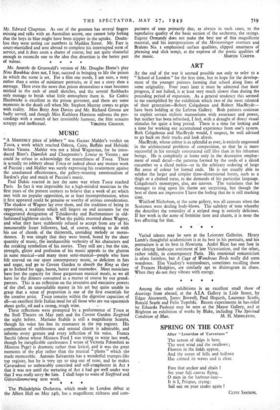MUSIC "A MASTERLY piece of jobbery" was Gustav Mahler's verdict
on Tosca, a work which reached Odessa, Cairo, Buffalo and Helsinki before Vienna. Mahler was not a blind Wagnerian, for he intro- duced Bizet's Djamileh and Charpentier's Louise to Vienna • nor could he refuse to acknowledge the masterliness of Tosca. There is actually no jobbery about Tosca or indeed about any mature work of Puccini ; and Mahler was surely expressing his resentment against the unashamed effectiveness, the gallery-winning emotionalism of Sardou's play and much of Puccini's music.
Paul Dukas reacted in just the same way when Tosca reached Paris. In fact it was impossible for a high-minded musician in the first years of the present century to believe that a work of art which met with no popular opposition, or at least incomprehension, when it first appeared could be genuine or worthy of serious consideration. The shadow of Wagner lay over them, and the tradition of being in opposition, a tradition which still lingers on and accounts for the exaggerated denigration of Tchaikovsky and Rachmaninov in old- fashioned highbrow circles. What the public resented about Wagner, and what they have stubbornly refused to accept from any of his innumerable lesser followers, had, of course, nothing to do with Ids use of chords of the thirteenth, unending melody or motto- themes. It was simply that they were bored, bored by the sheer quantity of music, the inexhaustible verbosity of his characters and the creaking symbolism of his stories. They still are ; but the size, strength, glitter and profusion of his music appeals to the glutton in some musical—and many more semi-musical—people who have felt starved on our spare contemporary music, so deficient in fats and sugar, and go to Covent Garden to absorb the Ring as they go to Ireland for eggs, bacon, butter and tournedos: Most musicians have lost the capacity for these gargantuan musical meals, as we all have for the dinners consumed as a matter of course by our grand- parents. This is no reflection on the inventive and executive powers of the chef, an unassailable master in his art but quite unable to grasp that a sense of proportion is one of the first essentials for the creative artist. Tosca remains within the digestive capacities of all—an excellent little Italian meal for all those who are not squeamish about garlic, oil and a strong, rough wine.
These reflections were prompted by a performance of Tosca at the Stoll Theatre on May loth and the Covent Garden Siegfried the night before. Mariano Stabile is still a magnificent Scarpia, though his voice has lost its resonance in the top register. His combination of ruthlessness and sensual charm is admirable, and informs every gesture and every inflection of his voice. Franca Sacchi (about whose Mistress Ford I was trying to write last week, though by inexplicable carelessness I wrote of Victoria Polombini as Mistress Page) is dramatic rather than lyrical, and it was the great moments of the play rather than the musical "plums " which she made memorable. Antonio Salvarezza has a wonderful trumpet-like top register, but he is very apt to sing out of tune, and he makes cavaradossi so unbearably conceited and self-complacent in Act r that it was not until the torturing of Act 2 had got well under way that I was really sorry flor him. I shall hope to write of Siegfried and Gotterdiimmerung next week. * * *
The Philadelphia Orchestra, which made its London debut at the Albert Hall on May 24th, has a magnificent richness and corn-
pactness of tone primarily due, as always in such cases, to the superlative quality of the basic section of the orchestra, the strings. Eugene Ormandy does not make the best use of this magnificent material, and his interpretations of the Meistersinger overture and Brahms No. i emphasised surface qualities, clipped smartness of phrasing and slick tempi, at the expense of the poetic qualities of






































 Previous page
Previous page